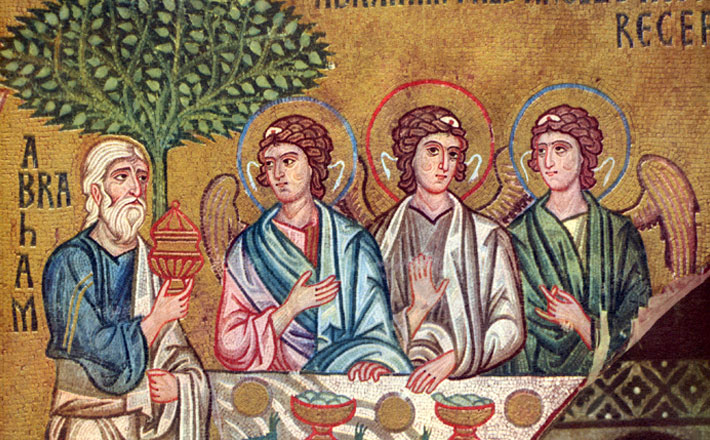Commentary on Psalm 15
Psalm 15 is usually categorized as an entrance liturgy.
The mention of God’s “tent” in v. 1 recalls the portable tabernacle of the wilderness era (Exodus 33:7-11; Numbers 12:5); but the designation came to be used of the Temple (Psalms 27:5-6; 61:4), which was located on Mount Zion, God’s “holy hill” (Psalms 2:6; 3:4; 43:3). While we have no actual description of a ritual for entering the Temple gates, it is reasonable to infer from Psalm 15, along with the similar Psalm 24, that such a ritual existed (see also hints of such a ritual in Isaiah 33:13-16; Micah 6:6-8). And we do know that the Temple was equipped with gatekeepers, whose responsibility it was to guard the purity of the place (2 Chronicles 23:19; see also Deuteronomy 23:1-8). Given the opening question of Psalm 15 and the similar questions in Psalm 24:3, it is reasonable to conclude that these two psalms functioned as responsive entrance liturgies.
But, of course, to anchor Psalm 15 in its ancient Israelite past raises the question: What does this text from long-ago and far-away have to with us and our markedly different context and identity? To begin to get at this question, it is helpful to start with what Jerusalem symbolized and what entering the Temple meant. Jerusalem was understood to be God’s place (see Psalms 46, 48, 87, 122, 132); and the Temple, God’s “house” (Psalm 5:7), was where one went to encounter and be encountered by God. The worshipper in Psalm 27:8 describes the experience in the Temple (see “tent” in 27:5-6) like this:
“Come,” my heart says, “seek his face!”
Your face, LORD, do I seek.
To be sure, the language is metaphorical; but such a direct, “face-to-face” encounter with God would surely have called for conscientious preparation; and it would have promised profound transformation (see also Psalm 24:5-6).
Such preparation and anticipated transformation are what Psalm 15 is really all about. Even in its ancient setting and use, it is not likely that vv. 2-5b functioned as a checklist of requirements. Rather, as James L. Mays says of vv. 2-5b, “It is a picture, not prescription.”1 In other words, what vv. 2-5b suggests is that worship — a genuine encounter with God and the experience of being encountered by God — will have pervasive and profound implications for personal character and conduct. This is still the case for Christians, who claim to experience God directly in Jesus of Nazareth, and who affirm that they regularly encounter God and are encountered by God in the preaching and hearing of the Word and in the real presence of God in the sacraments. In short, then and now, Psalm 15 invites the offering of our best selves to God in preparation for worship, even as we open ourselves to being further transformed by God in and through worship.
And, biblically speaking, what constitutes our best selves, and in what direction may we expect worship further to transform us? The general answer to this question – which is my contemporary paraphrase of Psalm 15:1 — is found in v. 2ab, followed by specific examples in vv. 2c-5b. We are to “walk blamelessly” and “do what is right.” The translation “walk blamelessly” is misleading, since it implies sinlessness; and this is not the point. A better translation would be “walk with integrity.” The Hebrew root involved means “to be complete” or “to be whole.” In Deuteronomy 18:13, the same adjectival form that occurs in Psalm 15:2 is translated “completely loyal,” and this may be the best translation. To approach God in worship invites our complete loyalty; and naturally, there are behavioral implications.
To “do what is right” or “do righteousness” is elsewhere the essence of God’s will, as both the Torah and the Prophets proclaim (see Deuteronomy 16:20, where NRSV’s repeated “justice” is the same word translated “right” in Psalm 15:2; Isaiah 1:21, 27; 58:2; Amos 5:7, 24). Complete loyalty to God and conformity to God’s will involve faithful and responsible speech (vv. 2c-3, 4c; see Psalms 5:9; 12:2-5, where the speech of the wicked is hurtful and destructive), as well as honest and compassionate action (v. 5ab). Not lending money at interest — a particular challenge in our consumer-capitalist system! — was a matter of compassion for the poor and dispossessed (see Exodus 22:25; Leviticus 25:36-37; Deuteronomy 23:19-20; Ezekiel 18:8, 13, 17; 22:12). Not taking a bribe was a matter of honesty, of course, but also of compassion for the needy (see (Exodus 23:8; Deuteronomy 10:17; 16:9; 1 Samuel 8:3; Isaiah 1:23; 5:23; 33:15; Micah 3:11).
In short, Psalm 15 suggests that the appropriate and faithful posture for worship — both in terms of preparation and anticipation — is complete loyalty to God and commitment to act compassionately for the sake of others. This, of course, should sound familiar, since it is essentially the way Jesus summarized the message of the Law/Torah and the Prophets (Matthew 22:24-40) — that is, love God unreservedly (see Deuteronomy 6:4-5) and love neighbor as self (see Leviticus 19:18). It is fitting, therefore, that interpreters detect a kinship between Psalm 15 and the torah-psalms (Psalms 1, 19, 119); and in this regard, the arrangement of Book I of the Psalter reinforces this kinship. Psalms 15 and 24 form the boundaries of a chiastic structure, as follows:
A Psalm 15 entrance liturgy
B Psalm 16 trust
C Psalm 17 lament
D Psalm 18 royal
E Psalm 19 torah-psalm
D’ Psalms 20-21 royal
C’ Psalms 22 lament
B’ Psalm 23 trust
A Psalm 24 entrance liturgy
At the heart of this chiasm is Psalm 19, vv. 7-14 of which is a celebration of torah (see “law” in v. 7), God’s teaching; and Psalm 15 complements this celebration by offering key components of God’s teaching.
Then too, it is fitting that Bellinger and Brueggemann also detect in Psalm 15 “a strong prophetic tone.” As they conclude: “Perhaps ancient Israel’s prophets learned their faith with this kind of emphasis in worship and in that way such worship influenced their preaching, as seen in Micah 6:6-8 and Isaiah 1:12-17.”2
Notes:
1 James L. Mays, Psalms (Interpretation: A Bible Commentary for Teaching and Preaching; Louisville: John Knox Press, 1994), 84.
2 William H. Bellinger, Jr. and Walter Brueggemann, Psalms (New Cambridge Bible Commentary; Cambridge: Cambridge University Press, 2014), 84.


July 17, 2016